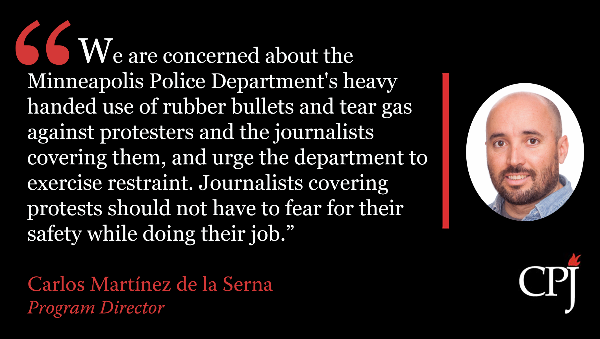This morning, Minnesota police officers arrested a CNN crew covering protests in Minneapolis while they were live on air, as seen in a video from the broadcaster. The crew was released about an hour later. CPJ issued a statement condemning the arrests.
As protests continue in Minneapolis over the death of George Floyd, CPJ is concerned about the police department’s use of rubber bullets and tear gas against protesters and the press. On Tuesday, one local journalist tweeted an image of a rubber bullet that he said police shot into his thigh. For information on how to stay safe while reporting on protests, journalists can consult CPJ Emergencies’ safety advisory.
In the Mexican state of Veracruz on May 24, unidentified gunmen attacked Mexican reporter Fernanda de Luna Ferral, who escaped unharmed. Two months prior, de Luna Ferral was placed under federal and state protection after her mother, journalist Maria Elena Ferral, was shot dead in the same state.
Journalism in the time of coronavirus
- In Myanmar, editor Zaw Ye Htet was sentenced to two years in prison for allegedly disseminating information that could “cause fear or alarm to the public”
- CPJ spoke with New York Times reporter Davey Alba about online harassment and covering conspiracy theories about the virus. CPJ’s latest safety advisory includes information on protecting against targeted online attacks
- At a West Bank checkpoint, Palestinian police assaulted and arrested journalist Anas Hawari and charged him with insulting a state employee, resisting a security officer, and violating the region’s COVID-19 emergency lockdown
- Journalists in Rwanda and Nepal were arrested and detained while covering COVID-19
Spotlight
Earlier this month, CPJ’s #FreeThePress campaign sent a letter and petition to U.N. Secretary-General António Guterres, calling on him to take urgent action on behalf of jailed journalists amid the pandemic. Guterres responded, emphasizing that the safety of journalists remains a key priority for the United Nations, saying, “No democracy can function without press freedom, which is the cornerstone of trust between people and their institutions, and which is most critical at a time of crisis when citizens demand accountability.”
This week, CPJ hosted a live Instagram Q&A with South and Central Americas Program Coordinator Natalie Southwick to discuss our reporting on the military surveillance of journalists in Colombia. Catch up on the conversation here, and follow us on Instagram here.
What we are reading
- How the free press worldwide is under threat — Gill Phillips, The Guardian
- Getting to the Source of Infodemics: It’s the Business Model — Nathalie Maréchal, Rebecca MacKinnon, and Jessica Dheere, Ranking Digital Rights
- Twitter fact-checks Trump, but will it do any good? — Mathew Ingram, Columbia Journalism Review
- Hong Kong Law Could Stifle Press Freedom, Rights Groups Say — Jessica Jerreat and Sahar Majid, Voice of America
- This newspaper has never forgotten the 1921 Tulsa Race Massacre — and its fight continues — Kurtis Lee, Los Angeles Times
- Unnecessary, disproportionate and widespread: The normalization of surveillance in Colombia and Latin America — Paula Martins, IFEX
Beyond the pandemic
- Two journalists detained on anti-state charges in Vietnam
- Ethiopian police ignore court orders to free journalists held since March
- Bulgarian investigative journalist arrested for drug possession days after filing information request
- Puerto Rico authorities subpoena Facebook for information from student media outlets
